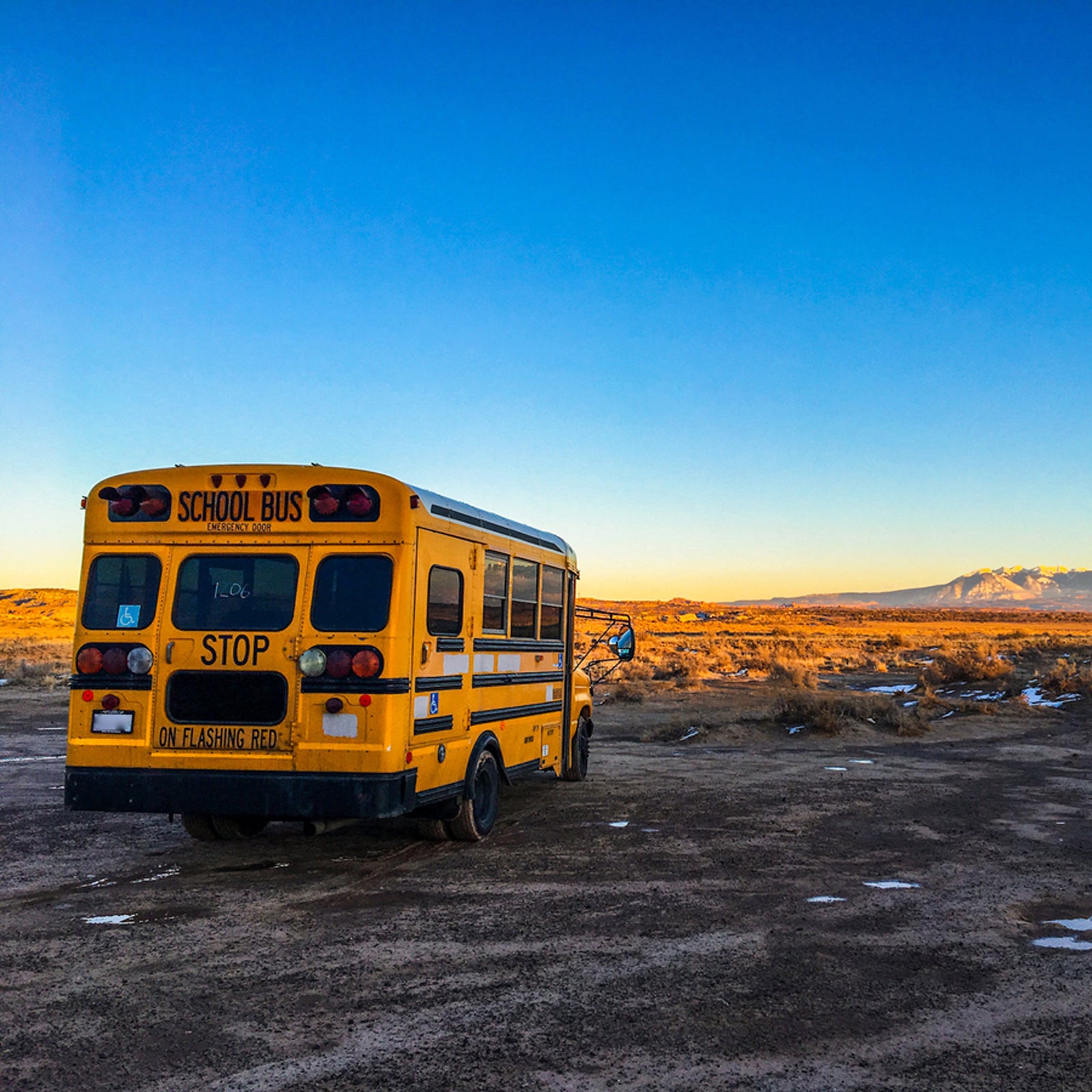“Your bus doubles as a bunker, right?”
Friends have been asking me variations of this question for weeks. For the past year, I’ve lived full-time on the road in a “skoolie,” as school-bus conversions are affectionately called. I have no other permanent residence. I’ve traveled around the western U.S., from Tucson, Arizona, to Cape Flattery, Washington, while subsisting on writing assignments and dwindling savings from my years working in advertising. In my bus, somewhat extravagant amenities, like a queen-size bed and nearly eight feet of kitchen-counter space, exist alongside realities of living on the road: no shower, bathroom, or running water. At a time when everyone wants to run for the hills, vanlifers may seem uniquely prepared to ride out the COVID-19 pandemic. But are we?
As the coronavirus era rapidly evolves, many nomads are grappling with just how self-contained their rig—and their life—really is. While some vans or buses have a full bathroom or some version of one, water storage is always a limiting factor—on top of a 50-plus-gallon tank, you also need a gray-water tank to catch runoff. Many of us rely on a steady schedule of showering at gyms or recreation centers and frequently restocking at grocery and general stores due to our vehicle’s lack of refrigeration. We also depend on the occasional campground or RV park.
Depending on how a vanlifer builds their rig, they’re struggling with different essentials right now: shower, toilet, food, power. Waste and resupply are problematic, too. Eventually, everyone needs a place to dump their gray water, empty their toilet, buy groceries, or get more clean water. Most places are closing, while the essential businesses that are staying open present a constant moral dilemma—as an outsider coming into a small community, I’ll be putting others at risk.
Are we as independent as we thought?
For the past two ski seasons, I’ve followed the snow to hit various Ikon Pass destinations, concentrating most of my time in Colorado and Utah. Earlier this year, I road-tripped from Taos, New Mexico, to Jackson Hole, Wyoming, before deciding to settle in Colorado. With a healthy snowpack, it looked like this year’s season might stretch into summer, and I wanted to be there if it did. Instead, I found myself in the ski towns that became the epicenters of the state’s coronavirus outbreak.
While my bus has treated me well, it’s simply a makeshift home on wheels—not a bunker.
Before shutdowns and shelter-in-place orders were regular news, closures swept through small mountain towns like Frisco, Silverthorne, and Breckenridge. After an employee at the Silverthorne Recreation Center was confirmed positive for COVID-19, the facility immediately closed on March 12. The rec center in Breckenridge followed suit the next day. Summit County libraries shut their doors on March 14. By the 15th, ski resorts across the country would close. Without anywhere to shower, use Wi-Fi, or get supplies, I was unsure where to go next.
The quiet shuttering of public services in Colorado generated far less noise than the abrupt end to the ski season, yet it’s far more impactful to nomads like me. Kate Fifer and Daniel Gaudenti were living in their bus and working restaurant jobs in Nashville, Tennessee, when the coronavirus hit. After calling to confirm their local Planet Fitness was open, Fifer and Gaudenti walked to the gym the next morning and found it closed. Even locating a bathroom became difficult, as the city’s coffee shops shut down, Starbucks became drive-thru only, and stores closed their public restrooms. It wasn’t long before Fifer and Gaudenti lost their jobs. Last week they made the decision to leave Nashville and start the drive back home to stay with family in Oregon.
The closure of ski resorts also meant the closure of their overnight parking lots and restrooms I’d been relying on. Colorado public-health officials urged everyone in Summit County to stay home. Without running water or a real toilet, staying in my bus for a 14-day self-isolation wasn’t possible, and I didn’t want to endanger my adopted community or myself.
I decided it was time to find a secure place to hunker down. So when old friends living in Texas invited me to park in their driveway and share their home, I jumped at the opportunity. I made the long drive as quickly and responsibly as I could, sanitizing gas pumps, scrubbing my hands with hand sanitizer, and practicing the CDC’s social-distancing guidelines. The two-day trip confirmed my decision to get off the road. Suddenly, even using a public bathroom felt risky. When I could, I chose to seek a quiet spot outside (following leave-no-trace principles, of course).
For those vanlifers who don’t have a place to go, the nomadic community is trying to crowdsource help. In small corners of the internet, spreadsheets and Facebook groups are circulating. Kind strangers across the country are offering driveways, spare bedrooms, and private land to those who have nowhere else to go. Every day I hear about more vanlifers being asked to leave RV parks, campgrounds, or the public lands they were staying on that are closing.
As with some in the outdoor community at large, a few vanlifers are ignoring the COVID crisis. But most are trying to do the right thing by hunkering down, relying on the hospitality of others, or returning home. The vanlife community has been forced to confront a few hard truths. We’re nomads, not survivalists. Whether it’s getting gas or using public showers, we come into contact with others, endangering others and ourselves. While my bus has treated me well, it’s simply a makeshift home on wheels—not a bunker.

